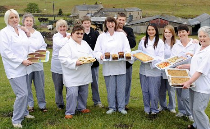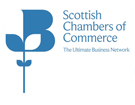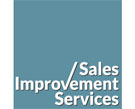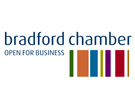- Resources for mentees
- Useful information
- Case studies
- Construction & property
- Consumer products
- Creative services
- Education & training
- Hotels & restaurants
- IT & telecoms
- Manufacturing
- Professional services
- Renewable energy
- Resources for mentors
- Other resources
- Regional events
- Best Practice Toolkit

Turning Country Fare from a sideline into an international business
Dianne Halliday runs Country Fare, from a former “traditional” farm in Cumbria.
When foot and mouth disease first hit the agricultural industry, Dianne Halliday set up a baking business from a former traditional farm in Cumbria. What started as a sideline in her kitchen is now her chief source of income, and Country Fare turns out thousands of cakes and biscuits each week.
Instead of producing milk, butter, eggs or flour, Dianne buys raw ingredients from neighbouring farms and turns them into award-winning cakes.
“We couldn’t make a living from the farm so we had to find another way to earn our keep,” says Dianne, 49, mother to James, 23, Richard, 22, and Anthony, 18.
“My husband, Tony, got work stonewalling, hedge planting and landscaping, keeping our 150-acre sheep farm going in the evenings. I turned to what I know best: baking.”
Dianne sources all the ingredients locally and employs a team of 12 people from neighbouring communities. She supplies restaurants, delicatessens and Asda stores nationwide, with products made using family recipes handed down from her mother and grandmother.
Dianne has really grown the business since its launch 12 years ago but when one of the Business Mentoring providers first met her at the end of 2009, she had become quite disillusioned with working so hard.
She was definitely working in her business and not on her business, and she did not know where to take it next.
Dianne’s personal mentor, Malcolm Wade, has really helped her to “step outside” and look at her business differently. When Malcolm first met Dianne, she was “unsure about the direction of business, lacking in confidence, and certainly not enjoying herself,” he says. “My main role has been to get Dianne to believe in herself. Since starting the programme, Dianne has grown in confidence, become more proactive and won more customers as a result.”
Malcolm also helped Dianne develop recruitment skills and, most importantly, helped her to overcome her reluctance to delegate. Dianne now employs an administration assistant who helps with marketing, accounting, etc, freeing her up to manage the business more effectively.
Country Fare now supplies international clients and several major stores, including Booths and Lakeland. And Dianne has been profiled in the Daily Mail newspaper.
“Meeting Malcolm has been absolutely fantastic. Mentoring has changed my business. I am running it differently, I have more confidence, I have improved my negotiation and interviewing skills, I delegate more and this has given me more time to develop the business,” says Dianne, who has recently negotiated a contract to supply Harrods and won the John Moore University Innovation Voucher Award for the development of two new cakes. These have been produced for overseas markets.
“Dianne is now much more financially aware, especially about profitability of product lines, and turnover has increased substantially,” concludes Malcolm.
As a mentor, Malcolm is gaining a lot of personal satisfaction seeing other people develop, both individually and in their business. He has an impressive corporate background in senior marketing, accounting and management roles with major automotive companies such as Rolls-Royce, Volvo and Cadillac, but hadn’t realised how much he could help SMEs.
When asked what the key ingredients for success in business mentoring are, Malcolm says: “The client needs to have a commitment to change and a willingness to put something into the mentoring relationship.”
Visit www.country-fare.co.uk.







